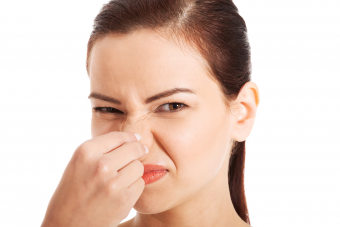What Does “P.U.” (As in Something Smelly) Stand For?
 Often used to accuse someone of exceeding his allotted level of funk, P.U. is, surprisingly, not an acronym, but, rather, likely was derived simply from the pronunciation of its parent word.
Often used to accuse someone of exceeding his allotted level of funk, P.U. is, surprisingly, not an acronym, but, rather, likely was derived simply from the pronunciation of its parent word.
Dating back to the early 17th century, a common exclamation of contempt for a foul odor was pyoo. As English spelling had yet to become standardized, this word was also written as pue, peugh, pew and pue. Although each variant was correctly pronounced pyü, often in practice, and particularly to express outrage, both syllables were stretched out with the pronunciation: pē-‘ū (pee-YOU), which, over the years, has been changed into P.U.
As for where the 17th century versions came from, this is anybody’s guess, with some linguists postulating that perhaps it came from the Latin “puteo,” meaning “stink, rotten, putrid.”
If you’re wondering about the origins of some of the other of the many words we have to describe things that smell bad, stink dates back to the mid-13th century, as does smell (although smelly is a relatively recent invention, first being seen in the mid-19th century).
Stench dates to the dawn of the 13th century and derives from Proto-Germanic, *stankwiz, and is related to the Old High German stanch, as well as the Old Saxon, stanc.
Fetid was a child of the Latin word fetidus, and dates back to the early 15th century, as does its cousin (now in disuse), fetor.
Reek, which originally was a verb meaning “to smoke,” took on the connotation of “to smell bad” in the 17th century.
Meaning just “a smell or scent,” odor entered the English language about 1300 and came from the Old French odor and the Anglo-French, odour, themselves children of the Latin word, odor, of the same meaning.
Redolent, also doesn’t necessarily mean a bad odor, and it dates back to the early 15th century and Old French, as well as the Latin word, redolentem.
Malodorous, was created in the 19th century by simply combining the common prefix, mal-, with odorous.
A word that is far older than I would’ve expected, funk, meaning “bad smell,” has been around since the early 17th century and is related to a French word, funkière, which means “to smoke.” It has been used to describe a particular style of music since 1959.
If you liked this article, you might also enjoy our new popular podcast, The BrainFood Show (iTunes, Spotify, Google Play Music, Feed), as well as:
- What Causes the “Old People” Smell?
- Why Asparagus Makes Pee Smell
- Why Garlic Makes Your Breath Smell Bad
- What Causes the Smell After Rain
- Is the “New Car Smell” Toxic?
Bonus Smelly Facts:
- For nearly as long as people have been living together in organized societies, they have been trying to hide their body odors. Egyptians, Greeks and Romans all enjoyed bathing, and the wealthy would even add fragrant aromas to theirs. The Romans soaked everything in perfume (including horses and pets), and Egyptian women would place scented wax on their heads, which, as it melted during the day, surrounded them with a pleasant fragrance.
- The first antiperspirants were solutions of aluminum chloride and were unpleasant to apply. Ban is credited with first inventing the roll-on deodorant, and Right-Guard with the first aerosol spray. (If you’re curious: Why Do Armpits Smell Bad?)
- Some of the ingredients in early aerosol sprays such as aluminum zirconium and their chlorofluorocarbon propellants were found to be dangerous to humans and the ozone layer, partially thanks to Nobel Prize winners Dr. F. Sherwood Rowland and Dr. Mario Molino discovering the damaging effects of chlorofluorocarbons on the ozone layer. By the late 1970s, manufacturers had stopped using chlorofluorocarbons and by 1978 they were banned in the United States, with a few exceptions. As a result, contrary to popular belief, aerosol sprays no longer damage the ozone layer.
- If you suffer from particularly excessive arm pit sweating and potential resulting smell, for a mere £3,500 (about $5,000), you can have your armpit sweat glands burned off with a laser in a procedure called Laser Sweat Ablation. Another option is to have a procedure to clamp the nerves that trigger sweating, called Endoscopic Thoracic Sympathectomy. Others choose a temporary route and have Botox injections, which cost about £500 (about $750) and last for anywhere from six months to a year.
- Poop generally stinks because of the sulfur-rich organic compounds produced by bacteria, such as indole, skatole, and mercaptans. Another contributing factor is a gas that is produced, hydrogen sulfide.
- Bird poop is white due to their kidneys extracting nitrogenous wastes from their bloodstream and subsequently excreting it in the form of uric acid, which has a very low solubility in water and emerges as a white paste-like substance.
- The word “poop” comes from the onomatopoeia poupen or popen, which originally meant “fart.” “Poop” came into its current meaning around 1900.
| Share the Knowledge! |
|





My guess would be that it comes from the French infinitive “puer” (to stink). “Ça pue !” in French means, That stinks!
Hi. I’m the disqus guy!